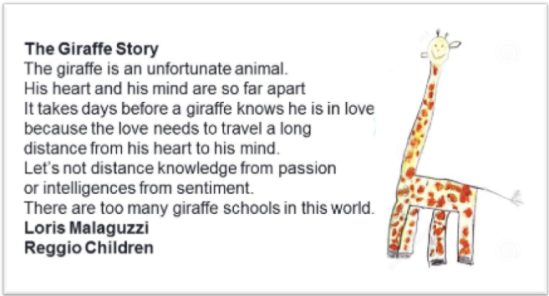By: Diane Kashin, Ed.D, RECE. Pedagogy is defined as the method and practice of teaching. For early childhood educators it is about the understanding of how learning takes place and pedagogical approaches employed to support learning. It is different than curriculum which is the content of the learning (Ontario Ministry of Education, 2014). An emergent curriculum assumes that the content of the learning is derived from the interests of the children . As I am often asked to support educators who are moving from a theme approach to an emergent curriculum, I am continually reflecting on where to start. Do you begin with the curriculum or with the interests of the children? I would suggest that you do neither. Begin with pedagogy and the pedagogical approaches that are grounded in the image of children, families and educators as competent and capable. At the top of the list of the approaches recommended by Ontario’s pedagogy for the early years, How Does Learning Happen? (2014) are responsive relationships.
From Australia, the term pedagogy is described as the holistic nature of early childhood educators’ professional practice (especially those aspects that involve building and nurturing relationships), curriculum decision-making, teaching and learning. Relationships are key as explained in this article that speaks to the importance. If “location, location, location” describes what is most important in real estate, then the mantra “relationships, relationships, relationships” can be applied to early learning environments. Relationships are the heart of pedagogy. This I know from Mr. Fred Rogers.

I wasn’t surprised when I learned that Mr. Rogers had studied child development . The documentary on his life should be required viewing for all early childhood educators.
Knowing that we can be loved exactly as we are gives us all the best opportunity for growing into the healthiest of people ~ Fred Rogers
We need to begin with positive, respectful, mutually caring relationships. To establish these relationships what is essential is active participation of all the subjects of education – children, families and educators. Start with relationships that support children’s sense of belonging and well-being. Then invite children to explore and actively engage while expressing themselves in a hundred languages and hundred, hundred more. My theory is that by taking this pedagogical approach, the curriculum will be revealed in authentic and meaningful ways. Once strong reciprocal and responsive relationships are in place curriculum can become authentic and meaningful. Connections and bonds between people enable teachers to really see children’s interests and understandings but it takes time. It takes time to understand the strategies they already know to stay calm, alert and focused. It takes time to see the way they engage with one another and materials. It takes time to see the processes they use for learning about their worlds. Take the time to think deeply about children and from the brain let your thoughts travel to your heart.
My concern is that curriculum does not co-exist with pedagogy and therefore the educator’s mind is not engaged. My other concern is as Malaguzzi so eloquently put forth that we leave our hearts out of the equation. When we see children and families as co-learners and co-constructors of the curriculum we engage the heart and the mind in our pedagogical approach to early learning.


Thank Diane for bringing forward the concepts of curriculum and Pedagogy. Curriculum is indeed the content but Pedagogy is the context. If we consider the possibilities of children in relation to one another, educators, the environment and family with the community, the curious will reveal itself in time through thoughtful and thought provoking materials. It is here the hundred languages exist and it is here the educator becomes one with the child’s learning and their own.
LikeLike
Wow!! Powerful piece to read. Absolutely loved it and as an RECE now dealing with lots of separation from little ones just starting their first experience in preschool, away from mom and dad, it is what I feel when interacting with them and the new parents. We need time to connect and bond, to know each other and to feel comfortable and trusting….then and only then we can start focusing on curriculum and how to develop it and enrish it!!
Thank you for this wonderful piece of reading!!
LikeLike
This kind of pedagogical approach speaks to me as the heart and soul of decision making in how to provide materials and experiences for all in our Early ON CFC program … relationships are key and should be driving the bus on how and what we do for the unique climates of our individual locations. Thank you for such a thoughtful supportive acknowledgment of what’s best for children and their families.
LikeLike
This kind of pedagogical approach speaks to me as the heart and soul of decision making in how to provide materials and experiences for all in our Early ON CFC program … relationships are key and should be driving the bus on how and what we do for the unique climates of our individual locations. Thank you for such a thoughtful supportive acknowledgment of what’s best for children and their families.
LikeLike
Pingback: Building Relationships in Early Learning: One Tea Cup at a Time | Technology Rich Inquiry Based Research
Pingback: Early Childhood Education: Making Sense of our Life’s Course | Technology Rich Inquiry Based Research